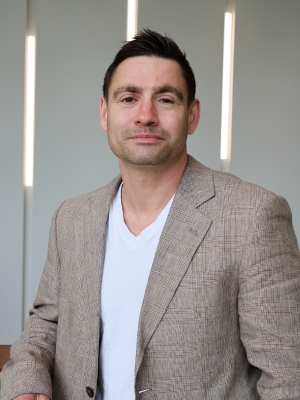FIMS News
Contact Information
FIMS Communications
Becky Blue
Email
519-661-2111x88493
FIMS & Nursing Building
Rm 2060C
Chris Arsenault joins FIMS as the new MMJC chair.
The Faculty of Information and Media Studies (FIMS) is excited to announce that award-winning journalist and professor Chris Arsenault will be joining the faculty as an assistant professor and the chair of the Master of Media in Journalism and Communication Program (MMJC) as of July 1, 2024. Arsenault has worked in the journalism industry for over 15 years and has built a unique and impressive portfolio as an international correspondent covering conflict, climate change, and natural resources on four different continents.
Arsenault has worked in the journalism industry for over 15 years and has built a unique and impressive portfolio as an international correspondent covering conflict, climate change, and natural resources on four different continents. Arsenault has worked for news outlets such as Al Jazeera, Reuters, and the Canadian Broadcasting Corporation (CBC). He received specialized training to report in hazardous environments. A story he covered in 2013 on the outskirts of Dubai became the career highlight.
Arsenault was one of only a few reporters to report from the scene of a wildcat strike on the outskirts of Dubai. Strikes are illegal in Dubai and the labour action resulted in mass deportation. Arsenault describes having to lay low as outsiders were easily recognized and not welcome.
“I did the reporting from the trunk of the car; I’d have to jump out, get the interview, and jump back in,” he says.
In 2019, Arsenault began teaching journalism at the postsecondary level while also working on his PhD in Journalism at the University of Sunderland in the U.K., where he studied best practices for international reporting. His academic work focused on investigative strategies for reporting internationally on the environment and natural resource deals.
In 2024, he successfully defended his thesis titled, Covering the great land rush: The role of frontline journalism in probing investment flows, displacement, and the struggle to feed a growing population in the climate change era. His peer-reviewed publications include a study on investigative journalism around Guyana's emerging oil industry and the geopolitics of high-seas fishing.
Arsenault later took on the coordinator role for the journalism program at Conestoga College and was responsible for curriculum development, organizing work placements for students, and teaching a diverse group of aspiring journalists. His teaching career did not supplant his journalism career, though. While teaching, Arsenault continued his work for CBC as a senior writer. He plans to continue reporting as he takes on the MMJC Chair position at Western.
“I am a journalist through and through; I know the industry has changed, but there will always be space for hard-nosed reporting.”
Arsenault acknowledges that the journalism industry is in a turbulent time, and that he is responsible for graduating students who can find employment, whether it be in journalism, communications, or another related field. He plans to consistently revisit student and alumni satisfaction to ensure they are succeeding after completing the program.
“Whether it is a job at The Globe and Mail, international travel, or developing entrepreneurial skills, I want students to graduate getting what they wanted from the program.”
MMJC students spend their year developing storytelling skills and practicing the fundamentals for both the journalism and communication industries. They produce lots of media and spend at least four weeks in a professional internship placement. Arsenault wants students to use what they produce when looking for a job.
“I am keen on making sure students are leaving with a demonstrable portfolio of the work they have done in the program.”
He acknowledges the role will be a challenge, but one he is looking forward to.
“It’s a dream come true to teach people who want to be here and want to know more about journalism and communication, "he says.
Find out more about the Master of Media in Journalism & Communication program at www.fims.uwo.ca/mmjc






